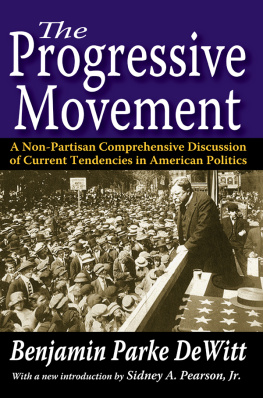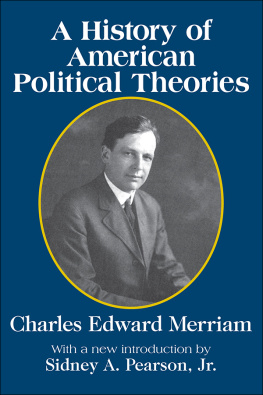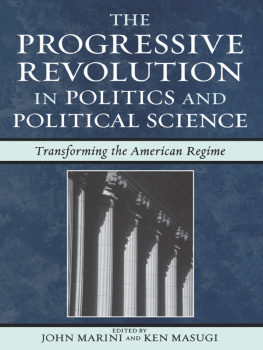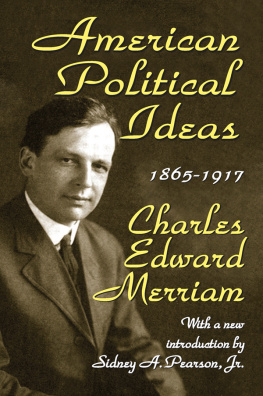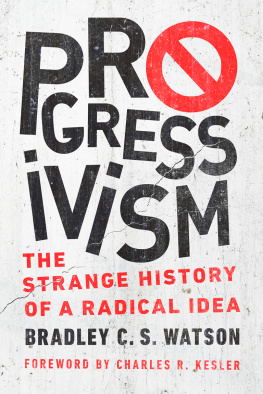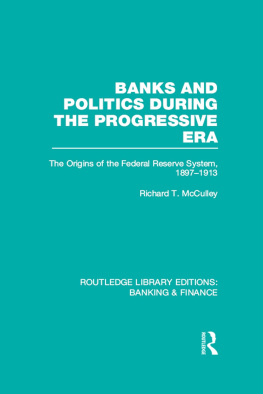Orginally published in 1915 by the Macmillan Company
Published 2013 by Transaction Publishers
Published 2017 by Routledge
2 Park Square, Milton Park, Abingdon, Oxon OX14 4RN
711 Third Avenue, New York, NY 10017, USA
Routledge is an imprint of the Taylor & Francis Group, an informa business
New material this edition copyright 2013 by Taylor & Francis.
All rights reserved. No part of this book may be reprinted or reproduced or utilised in any form or by any electronic, mechanical, or other means, now known or hereafter invented, including photocopying and recording, or in any information storage or retrieval system, without permission in writing from the publishers.
Notice:
Product or corporate names may be trademarks or registered trademarks, and are used only for identification and explanation without intent to infringe.
Library of Congress Catalog Number: 2012008144
Library of Congress Cataloging-in-Publication Data
De Witt, Benjamin Parke.
The progressive movement: a non-partisan comprehensive
discussion of current tendencies in American politics /
Benjamin Parke DeWitt; with a new introduction by
Sidney A. Pearson, Jr.
p. cm.
Includes index.
Originally published: New York: Macmillan,1915, in series: The citizens
library of economics, politics, and sociology. New series.
ISBN 978-1-4128-4962-3
1. United StatesPolitics and government1909-1913. 2. Progressive
Party (1912) 3. Municipal governmentUnited States. I. Title.
JK271.D5 2012
324.27327dc23
2012008144
ISBN 13: 978-1-4128-4962-3 (pbk)
Sidney A. Pearson Jr.
The liberal-progressive science of politics that emerged at the end of the nineteenth and early twentieth centuries has been the dominant academic tradition ever since it first appeared. Its formative period was from approximately the 1880s until the end of Woodrow Wilsons administration in 1920. It arose as a direct challenge to the political science of the founders at virtually every level of political principle. Among its most striking features is how quickly and how completely it replaced the earlier political science of the founders among so many intellectuals. The source of the founders science of politics was and remains well known in popular culture; it is found in the Declaration of Independence, the Constitution, and, most prominently, in The Federalist. By contrast, there is no single document or work in the progressive tradition that rivals that of the founding. The liberal-progressive science of politics has rather been the accumulation of numerous works, some clearly more important than others. The most important writers in this tradition were Woodrow Wilson, Herbert Croly, Charles Beard, and a few others less well known today. Among the lesser-known writers who worked to establish the liberal library is the too often overlooked and neglected work of Benjamin Parke DeWitts The Progressive Movement (1915); it deserves to be read as one of the neglected, if sometimes quirky, gems of the progressive era at its origins.
The Progressive Movement is the first narrative history of the Progressive Era that aims at a comprehensive history of both the theory and practice of politics from a progressive perspective. It remains the paradigmatic example of how the progressive tradition has been understood by progressives. DeWitts account of the past, present, and, most importantly, his view of the future of the progressive science of politics, provided the liberal-progressive tradition in America with its first full narrative history at a time when it was not yet the dominant interpretation of the American political order. Its greatest importance, however, both when it first appeared and subsequently, lies in DeWitts conception of where the broad-based progressive critique of the founders was heading. Wilson, Croly, Beard, and others had established the progressive basis for how to critique the founders, but were vague as to what the progressive future might look like. DeWitt helped to fill-in the blanks.
The New Political Science and the Idea of Progress
When it first appeared, DeWitts history of the origins and destiny of the progressive tradition commanded a respect that placed him in the same company as now better-known writers. His strongest rival for this particular distinction at the time was Herbert Crolys Progressive Democracy (1914). That contemporary judgment may seem a bit too strong rereading him a century later. After all, the historical narrative of the liberal progressive tradition was implicit in a number of writers before The Progressive Movement. But such a later reading would tend to overlook what makes his narrative so insightfulhis idea of the socialist future of progressivism. Among his contemporaries, no writer provided a better roadmap of where progressivism was going than did DeWitt. That roadmap deserves to be treated with respect, if not agreement. It ought to be read as a classic work in the new, progressive science of politics.
It is the idea of progress that provides the conceptual framework for his work and requires the closest attention. How DeWitt and other progressives understood practical politics is inseparable from this foundation. On the face of it, DeWitts narrative is structured around a standard progressive interpretation of politics. is a discussion of the Progressive Movement in the nation as a whole. This is the heart of his narrative because in it he defines the goals of what progressives mean by reform of the regime. They do not mean a mere tinkering, the passage of a few specific policies, or even constitutional amendments. Rather, the stated goal is a radical refounding of regime on principles that would support a more European form of collectivism, which DeWitt identified as socialism.
deal with specific procedural reforms in state and city government that gave DeWitts narrative its practical appeal. It is in this pragmatic, policy-oriented portion of his work that DeWitt also lays the groundwork for a new understanding of citizenship that was often implicit in other progressives but made explicit in DeWitt. He explored the practical implications of this new type of citizen better than any of his contemporaries, perhaps because he placed his discussion within the context of very practical policy proposals. The new citizen was required in order to make the progressive science of politics work. Each of these points, however, would lack the unity of theory and practice without the idea of progress that was the basis for his contemporary reputation. It is the idea of progress that informs the underlying unity of The Progressive Movement and ties together the work as a whole.
The idea of progress was the great idea that unified the Progressive Movement and DeWitt embraced it in its entirety. To paraphrase Marx, the idea of progress was the philosophical opium of the progressive intellectual class. The idea of secular progress was the self-evident truth upon which DeWitts narrative was built. The very term progressive is one that resonates powerfullymore powerfully in some quarters than the older term liberal. Liberalism, after all, is a term of political discourse with an ambiguous genealogy; the founders considered themselves to be liberals in the classical meaning of the term and the progressive revolt against the founders made the term liberal suspect for that reason alone. The language of progressivism, by way of contrast, can be traced with a greater degree of precision specifically to the Progressive Movement. The word progressive carries with it connotations about how to recognize who is who in the political arena; it distinguishes the just from the unjust, the good guys from the bad guys in ways that liberalism does not. The progressive historian Charles Beard wrote that the idea of progress contain[s] within itself a dynamic power to move individuals and nations, to drive them in the direction of effecting the ends and institutions implicit in it. He was surely correct in this judgment.

